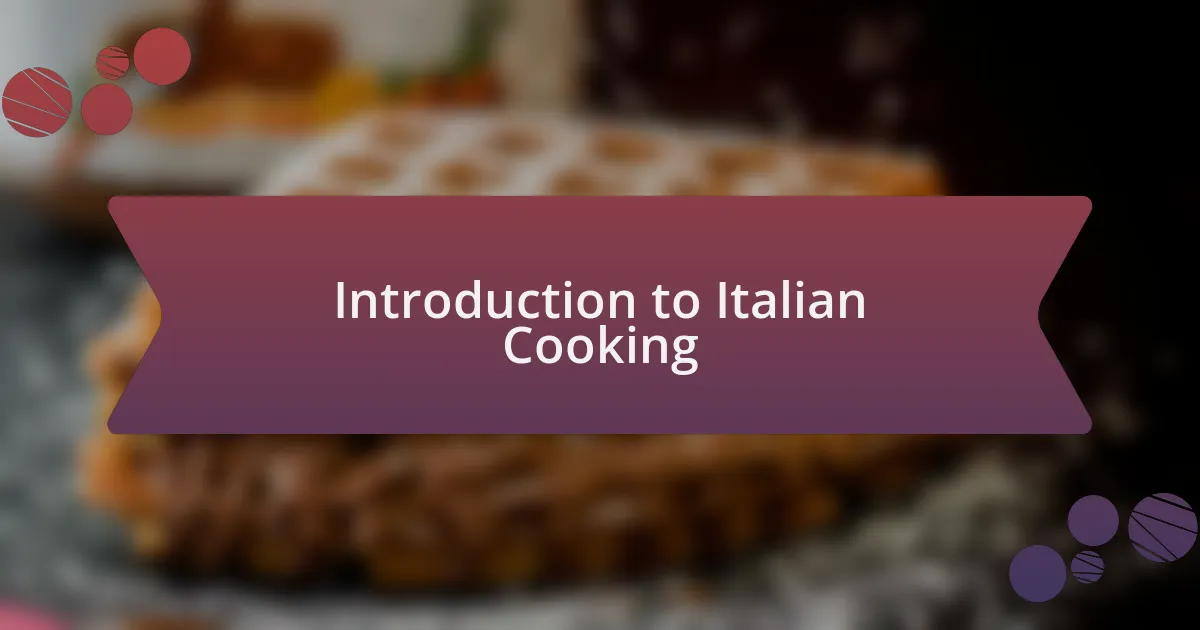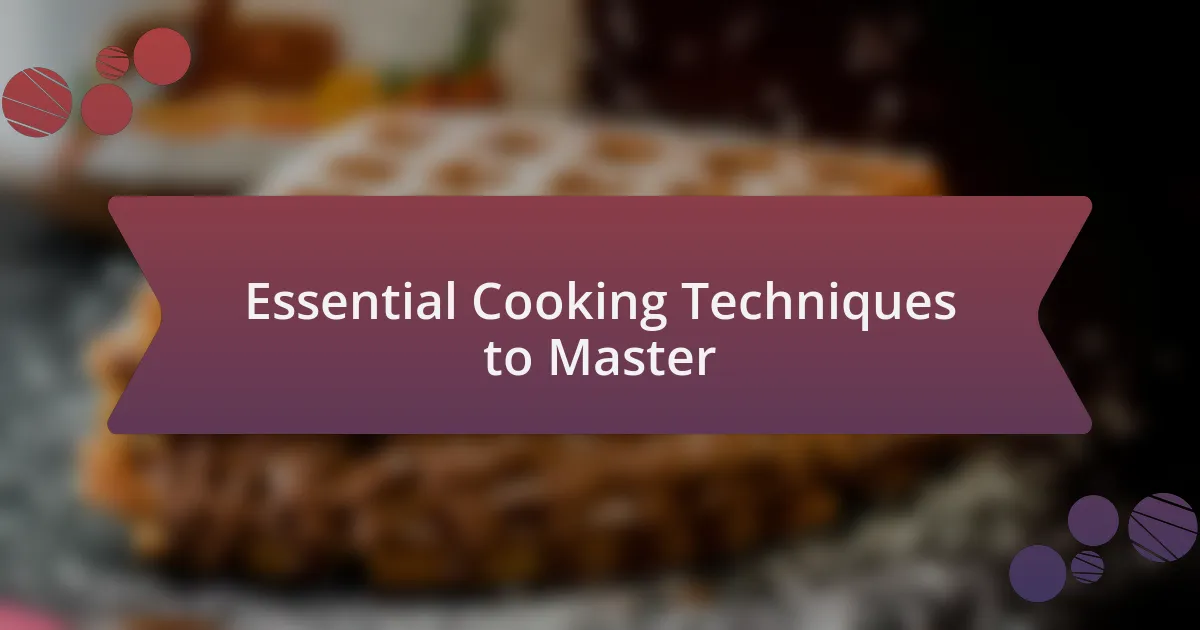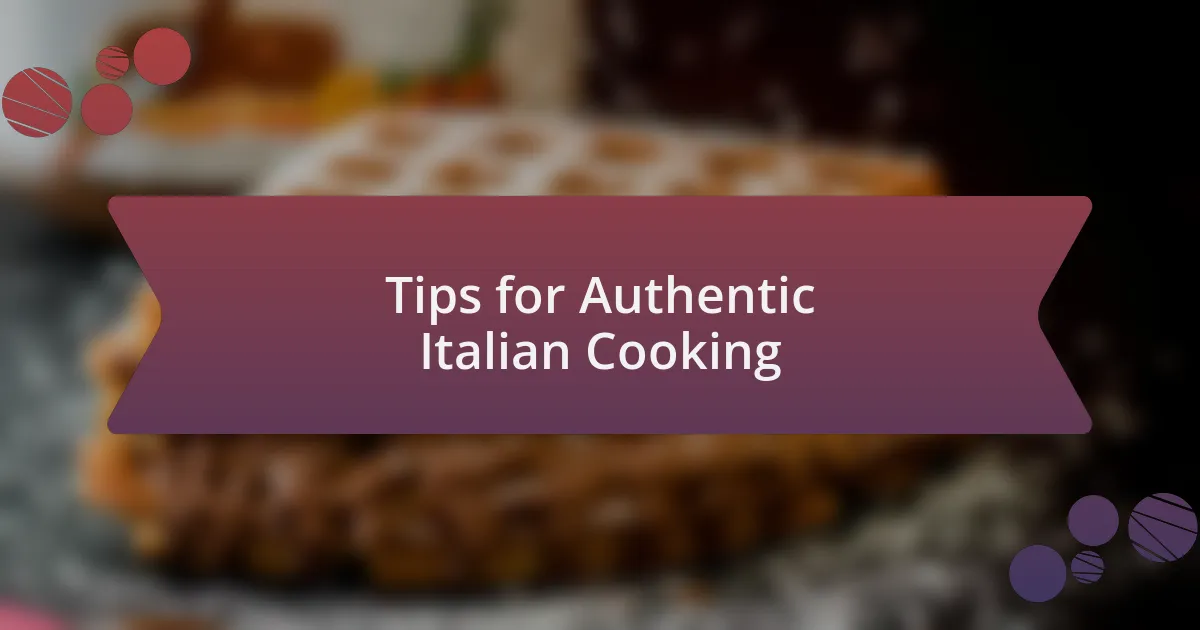Key takeaways:
- Italian cooking embodies tradition and passion, with each region offering unique variations on classic dishes.
- Key ingredients such as tomatoes, basil, and olive oil are fundamental, showcasing the simplicity and authenticity of Italian cuisine.
- Essential techniques include mastering knife skills, proper pasta cooking, and sauce-making, which enhance the flavor and quality of dishes.
- Cooking becomes a personal journey, connecting generations through recipes and shared family experiences.

Introduction to Italian Cooking
Italian cooking is more than just a set of recipes; it’s a cultural journey filled with tradition and passion. I remember the first time I attempted to make homemade pasta. The moment my hands kneaded the dough, I felt a deep connection to my family’s roots—it was exhilarating and a little daunting all at once.
Every region in Italy offers a unique twist on classic dishes, which makes exploring Italian cuisine so delightful. Have you ever tasted the difference between a Bolognese sauce from Emilia-Romagna and one from Naples? The variations tell stories of history, geography, and the people who brought these flavors to life. Each recipe I’ve tried has been like peeling back a layer of a rich tapestry, revealing the heart of Italian culture.
The beauty of Italian cooking lies in its simplicity. Fresh ingredients take center stage, allowing their natural flavors to shine. One evening, while sautéing garlic and tomatoes, the fragrant aromas filled my kitchen and sparked memories of family dinners. It was a moment of joy, reminding me that cooking can bring us together, even if we’re miles apart from loved ones.

Key Ingredients in Italian Cuisine
When I think of Italian cooking, the first ingredients that come to mind are tomatoes and basil. They form the foundation of so many beloved dishes. I fondly recall a summer stroll through a local market in Italy, where the vibrant red tomatoes were bursting with flavor. Just imagining them in a caprese salad makes my mouth water. Have you ever tasted a ripe tomato straight from the vine? It’s a game-changer.
Olive oil, another cornerstone of Italian cuisine, is something I can never compromise on. I remember the first time I drizzled high-quality extra virgin olive oil over a simple bruschetta—what a revelation! It was a reminder that the simplest dishes can often be the most memorable. Every time I cook, I make sure to reach for a bottle that reminds me of that trip. It’s like pouring a little bit of my travels into every meal.
Another key ingredient that showcases the diversity of Italian cooking is cheese. From the creamy richness of mozzarella to the sharp tang of Parmigiano-Reggiano, each type tells a story of its own. The first time I crafted homemade ravioli filled with ricotta, I felt like an Italian nonna. Have you tried making your own cheese? That experience entirely changed how I approach cooking.

Essential Cooking Techniques to Master
Mastering knife skills is crucial in Italian cooking. I still remember the thrill of learning to chop onions and garlic with precision; it was like unlocking a hidden door to flavor. Have you ever felt the satisfaction of a perfectly sliced ingredient? That simple skill can elevate a dish, allowing the flavors to meld beautifully and effortlessly.
Another technique that I can’t stress enough is proper pasta cooking. It’s not just about boiling water, but understanding the concept of al dente. I learned this the hard way; my first few pasta attempts were either mushy or too tough. Testing the pasta a minute or two before it’s done has made such a difference. It’s a small adjustment that transforms the texture and keeps each bite delightful.
Lastly, mastering the art of sauce-making truly brings your dishes to life. I recall spending an afternoon with a close friend as we simmered tomatoes, garlic, and herbs, filling the kitchen with an aroma that felt like a warm hug. It taught me that patience is key; allowing flavors to develop over time can create a depth that’s simply unforgettable. Have you ever tasted a sauce that just sang with flavor? That’s the magic of a well-crafted sauce.

My Favorite Classic Italian Recipes
When it comes to classic Italian recipes, the first dish that comes to mind is risotto. I vividly recall the first time I stirred a bubbling pot of arborio rice, coaxing it to creamy perfection. The slow addition of broth felt meditative, and I can still remember the way my family gathered around the table, spellbound by the aroma of parmesan and saffron filling the air. Have you ever experienced that magical moment when the first bite offers warmth and comfort?
Another favorite of mine is lasagna, a dish that brings layers of love and tradition to the table. I can still hear my grandmother’s laughter as we layered each component—the rich meat sauce, creamy béchamel, and endless sheets of pasta. There’s a certain joy in creating this dish, knowing that every forkful is a nostalgic journey back to family gatherings. Does anything compare to the feeling of sharing a homemade meal, crafted with your own hands?
Lastly, I hold a special place in my heart for tiramisu. This dessert feels like a tangible expression of love; the way the coffee-soaked ladyfingers playfully mingle with the velvety mascarpone is pure bliss. I remember making it for a special occasion and feeling a rush of excitement as my friends took their first bite. The smiles on their faces confirmed what I had always believed: good food brings people together and creates lasting memories. What are the culinary secrets that make a dessert truly unforgettable for you?

Personal Stories Behind My Recipes
As I reminisce about my journey with authentic Italian cooking, I can’t help but think of the day I first attempted to make fresh pasta. The dough slipped through my fingers like a living thing, and I felt a deep connection to the generations of my family who had done the same. Have you ever felt that sense of continuity, as if you are part of something greater than yourself?
The aroma of simmering tomato sauce takes me back to summer afternoons spent at my aunt’s kitchen. I remember her teaching me the importance of letting the sauce cook low and slow, stirring it gently as she shared stories of her childhood in Naples. It wasn’t merely about cooking; it was about weaving history into every bite. Isn’t it fascinating how food can carry memories that last a lifetime?
Then there’s the time I decided to recreate my Italian friend’s grandmother’s pesto. I remember standing in the kitchen, surrounded by fresh basil, garlic, and pine nuts, trying to capture that unmistakable burst of flavor. As the vibrant green sauce came together, I realized that recipes are not just ingredients; they are a connection to the people we love. What traditions do you cherish that revolve around food?

Tips for Authentic Italian Cooking
When it comes to authentic Italian cooking, sourcing your ingredients is essential. I vividly remember my first visit to a local Italian market, where the vibrant colors and fresh scents swept me off my feet. Picking out ripe tomatoes and fragrant basil felt like gathering treasures from an ancient tradition. Have you ever tasted the difference that fresh ingredients make in your cooking? It’s like a revelation.
Another tip I found invaluable is to embrace simplicity in preparation. One evening, I was struggling with a complicated recipe and decided to simplify it to just olive oil, garlic, and fresh vegetables. The result was a stunning dish that celebrated the flavors without unnecessary distractions. Sometimes less is more, don’t you think? The essence of Italian cuisine lies in highlighting the natural taste of each ingredient.
Lastly, never underestimate the importance of time. I learned this while making risotto for the first time. Standing by the stove, stirring and gradually adding broth, I experienced a meditative connection with the dish. It taught me that true Italian cooking often requires patience and love. How often do we rush in the kitchen? Taking the time to savor each moment can transform a meal into an unforgettable experience.